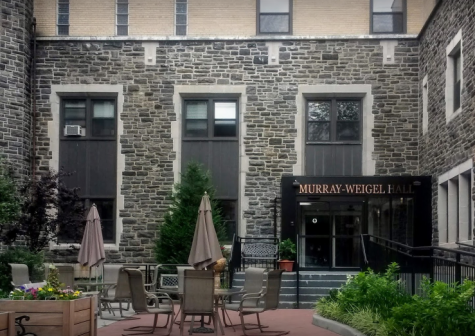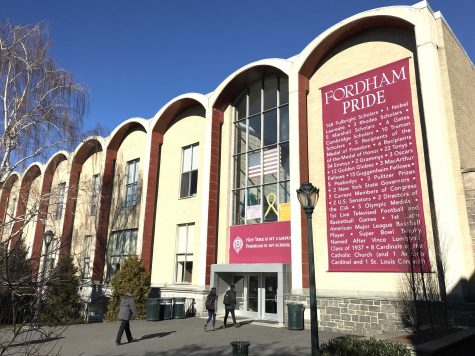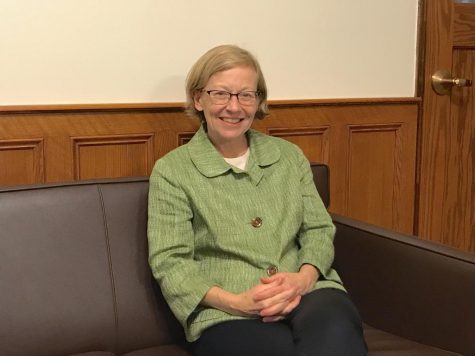Poet, Playwright, Professional Tells Story
Maria Aponte, pictured above, is a writer and performer when she is not working full time for Career Services. (Courtesy of Marisol Diaz)
December 5, 2018
By Joergen Ostensen
Maria Aponte, who works in Career Services as assistant director of global diversity and inclusion, wrote poetry for a long time before she realized she was telling the story of her life.
In 1995, she was working full-time at Marymount Manhattan College while enrolled as an undergraduate. Towards the end of the semester, her professor set aside time for students to read poetry or writing they had done. She read a poem called “La Marqueta,” which describes a market in the El Barrio neighborhood at the corner of 116th and Park, near where she grew up. Aponte used to shop for root vegetables there as a kid with her great-grandma Rosa on Saturday mornings.
Aponte said a friend in the class named Roberta Raymond, a professional ballet dancer, said she wanted to introduce her to somebody who ran a company called ShotGun Productions.
Aponte said that was how she met Patricia Klausner. Klausner told her to bring everything she had ever written to her apartment at 35th Street and 2nd Ave. Aponte said she arrived with a big bag of crumpled papers. One of her poems had been written on the back of a carton.
Klausner looked at the poetry through little round glasses while chain smoking, and told Aponte something she had not realized.
“She sits there and goes ‘you know what, you don’t know this, but you’ve been telling your story,’” Aponte said.
My work as an artist, as a writer, as a woman of color, as a latina, as a Puerto Rican, as a puertorriqueña, [is] about my culture. Because I don’t think there’s anything wrong with being able to fit in everywhere.”
— Maria Aponte
Aponte, who is Puerto Rican, said growing up in El Barrio in East Harlem was tough and she had to learn how to survive at young age.
She said she struggled to find an identity as a kid. According to her, what helped her to find it was creating art.
“My work as an artist, as a writer, as a woman of color, as a latina, as a Puerto Rican, as a puertorriqueña, [is] about my culture,” she said. “Because I don’t think there’s anything wrong with being able to fit in everywhere.”
Aponte’s mother died of an illness when she was 16. Aponte had been an actor at one point, working in public theatre in the city in the 1970s and ’80s, but she had always avoided confronting the pain caused by the loss of her mother. She said part of the reason is that her culture has a tendency to encourage pushing bad things away, which can be destructive.
According to her, it was essential that she face the tragedy in her life.
“If you don’t [address the problem] it comes out anyway somewhere in your life,” she said.
She said ShotGun Productions encouraged her to write a one-woman play telling her story. Her play, “Lagrimas de mis madres,” debuted at the Asia Society in Manhattan as part of a four-part series of productions that told the stories of women.
Its title translates to “tears of my mother” and tells the stories of the women in her life going back to the 1940s. Aponte played all 15 characters, including the part of her mother as she dies.
“I actually wrote about what it was like to be a nine-year-old caretaker of a terminally ill parent,” she said.
She said the play, which was performed for over 10 years all around the United States and Puerto Rico, helped her come to terms with the tragedy in her life.
“It helped me to unblock a lot of painful stuff,” she said. “There’s nothing more powerful than to face your own fears and your pain and then heal,” she said.
She said the play was well-received, even by people who look nothing like her.
In the early 2000s, Aponte was invited to perform at Franklin College, an agricultural school in the Midwest. She said the audience was white young men learning to be farmers, whom she did not expect to be fans of her work. However, after the show, one of the teachers approached her as she was leaving and asked if she would speak with the students.
Aponte said there was a line of young men waiting for her to sign their programs. She talked to them individually about their families and many told her how much they connected with the story.
“It was hard for me because I was gonna start crying,” she said.
She was surprised that her story about a Puerto Rican family on welfare could resonate universally.
She said she tells young writers to discover what their identity is.
“Find your voice, that’s gonna make you unique and tell that story, because you might help a nine-year- old,” she said.
Aponte said she also understands the importance of telling the stories Puerto Rican women.
“It became a mission to tell the story of Puerto Rican women from the perspective of getting away from being stereotyped,” she said.
As she gets older, Aponte said she is realizing the necessity of passing on her knowledge to young people, especially given the prevalence of hate in this country.
Aponte said it was her mother who made her aware of the impact of racism in America. According to her, when she was a little girl her mother used to tell she already had three strikes against her.
“You’re black, you’re uneducated and you’re poor. You can take care of the last two but you can never change the first,” she said.
For her, Fordham’s recent efforts to curb racism on campus is comparable to acknowledging the pink elephant in the room.
“It was sorta like okay we have the pink elephant and it won’t go away, you can’t go around it, it’s not shirking, it’s right there,” she said. “Oops I bumped into it, oh man and it’s got a trunk.”
She said when a student wrote a racial slur on the door of a black student’s dorm room in 2012, the explicit racial hatred had a major impact on her as an administrator of color.
“It affects us even more because we had to grow up with that, we had to survive that,” she said.
Aponte was tasked with creating an annual event that celebrates diversity on campus. She said since then, she has helped put on the Global Diversity and Inclusion Conference.
“Part of the healing process had to be to create a positive gathering to make people more aware and conscious of diversity, cultural differences, cultural norms,” she said.
Aponte said just being able to listen to different people can have a major impact. According to her, hatred arises from a breakdown in communication.
She said the ability to listen to others was talked about at diversity conferences she attended back in the 1990s. According to her, people would often come in to the meetings very angry about what was going on, but despite their passion they were able to acknowledge the necessity of being capable of agreeing to disagree.
Aponte said she knows from attending national conferences that Fordham is not the only school dealing with racism. According to her, recent efforts are a step in the right direction. She said she hopes Fordham can confront racism in the same she confronted her personal loss.
“We’re at the very beginning of change,” she said.
Aponte still dreams of performing on Broadway and is planning on writing science fiction this winter. According to her, she has always balanced her writing with full time jobs and has and will continue to write whenever she finds time, even on the D train.
She said wants to remind students to be kind to one another.
“Walk softly, be kinder to yourself, be kinder to others and it will all come back to you,” she said.










If you want a picture to show with your comment, go get a gravatar.